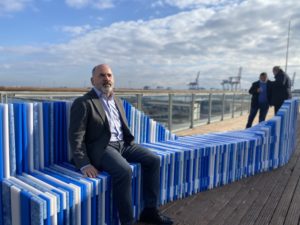
The project has been developed by the Technological Institute of Plastics, with funding from CaixaBank and the Bancaja Foundation.
A bench weighing 840 kilos and six metres has been installed in the Marina de València, made of 100% recycled plastic material that includes in its composition 15% of unused fishing nets and other marine waste.
The Port Authority of Valencia (PAV) is committed to projects that favour environmental sustainability and the circular economy.
The PAV, through the Valenciaport Foundation, is participating in the RepescaPlas project to obtain high added value products from marine waste.
In addition, Aportem continues with the No Plàstic campaign for the elimination of plastic containers in the logistics-port community of Valencia for other recyclable materials.
The Port Authority of Valencia (PAV) is making a firm commitment to projects that favour environmental sustainability and the circular economy. An example of this commitment is that the PAV has supported the presentation of the project for the recovery of marine waste in urban furniture developed by AIMPLAS, the Technological Institute of Plastics. This initiative has made it possible to manufacture new items of furniture, specifically an 840-kilogram, six-metre bench made of 100% recycled plastic material that includes 15% of unused fishing nets and other marine waste in its composition. The bench is located in the Marina de València, in the Innsomnia facilities, and forms part of a project financed by CaixaBank and the Bancaja Foundation.
The furniture has been made thanks to the mechanical recycling of plastic waste, which has given it a new life in the form of a bench with an innovative design that emulates the waves of the sea. The project, presented by Sonia Albein, principal investigator of the project and leader of Mechanical Recycling at AIMPLAS, has counted with the participation of the company CM Plastik and the collaboration of Mares Circulares and Asociación Vertidos Cero. The head of Strategic Planning and Innovation of the PAV, Juan Manuel Díez Orejas, emphasised in the presentation of this initiative “the importance for the port community of these actions which are in line with the strategic objectives of Valenciaport 2030, zero emissions, a set of proposals which are translated into concrete actions”.
Other initiatives
In this sense, among the actions carried out by the PAV, the RepescaPlas project stands out, in which it participates with the Valenciaport Foundation, which is in its fourth year removing plastic and other waste from the sea, studying how they affect the maritime ecosystem and recovering them to transform them into new resources that serve society. The initiative also involves AIMPLAS, the Asociación Vertidos Cero, the Cofradía de Pescadores de Gandía, the Cofradía de Pescadores de la Restinga, the Global Nature Foundation, the Port of Marín and the University of Vigo, with the collaboration of the Biodiversity Foundation of the Ministry for Ecological Transition and Demographic Challenge, through the Pleamar Programme, co-financed by the FEMP.
The Valenciaport Foundation also coordinates the European project “LOOP-Ports-Circular Economy Network of Ports” funded by the European Institute of Innovation and Technology (EIT) through EIT Climate-KIC. This initiative facilitates the transition towards a more circular economy in the port sector, where products, materials and resources are not considered as waste but can be turned into sustainable business models that can be replicated in ports of similar characteristics. The project, through the creation of a Port Circular Economy Network, will provide an innovation ecosystem to stimulate these actions, which will focus on materials such as plastics, metals, cements and biomaterials.
On the other hand, the PAV is actively participating in the No Plàstic campaign coordinated by Aportem-Puerto Solidario Valencia, a project with a very ambitious double objective: on the one hand, to change the paradigm in the use of plastic and replace it with recyclable materials in the Port of Valencia; and, on the other hand, to raise awareness of the problems generated by the abusive use of materials derived from plastic.

